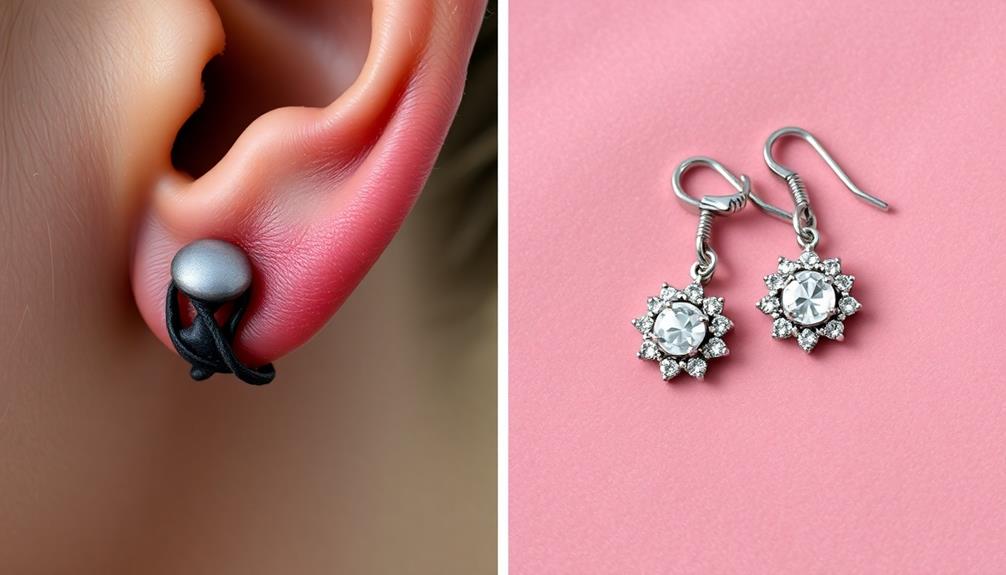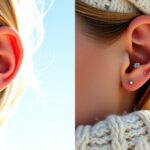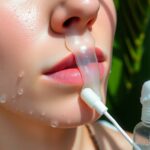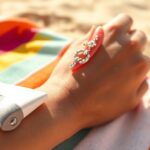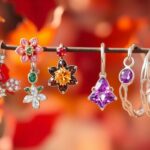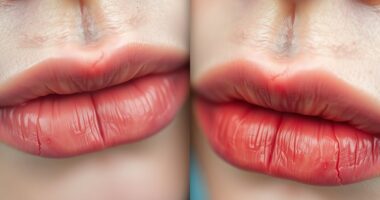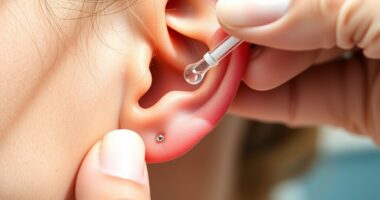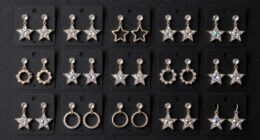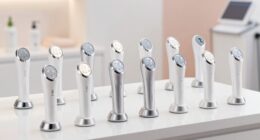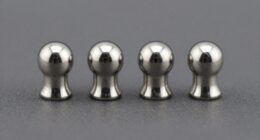Seasonal care for your piercings is essential, as summer heat can cause swelling and winter's dry air can irritate your skin. To help your piercings heal properly, stay hydrated in the summer and use a humidifier during the winter months. Always clean your piercings with saline solution to avoid infections, and be cautious about swimming in pools or oceans. Dressing appropriately for the season—like wearing soft fabrics in winter or breathable clothing in summer—will reduce irritation. Want to guarantee your piercings stay in great shape year-round? You'll find more helpful tips on effective seasonal piercing care.
Key Takeaways
- In winter, use a humidifier to combat dry air and promote healing of piercings.
- Stay hydrated in summer to reduce swelling in fresh piercings due to heat and humidity.
- Regularly clean piercings with saline solution, especially during hot weather to prevent infections.
- Choose soft, breathable fabrics to minimize irritation and friction on piercings during seasonal changes.
- Monitor for signs of infection and adjust aftercare practices based on seasonal conditions.
Seasonal Impact on Piercings

Understanding the seasonal impact on piercings is important for proper care and healing. In cold weather, the healing process can slow down considerably. The dry indoor heat can lead to skin irritation and dryness, which might affect the skin around your fresh piercings.
You'll want to keep that area moisturized to prevent complications.
In contrast, during the summer months, fresh piercings can experience increased swelling due to heat and humidity. It's essential to stay cool and hydrated to minimize this swelling.
Be mindful of seasonal allergies that can also exacerbate skin sensitivity, making it crucial to care for both fresh and healed piercings.
Traveling can add another layer of complexity to your piercing care. Pressure changes during flights can cause swelling, especially during summer when you might be traveling more.
As the seasons change, fluctuations in humidity can impact the moisture balance of your skin, which is key for ideal healing.
Health and Hygiene Considerations
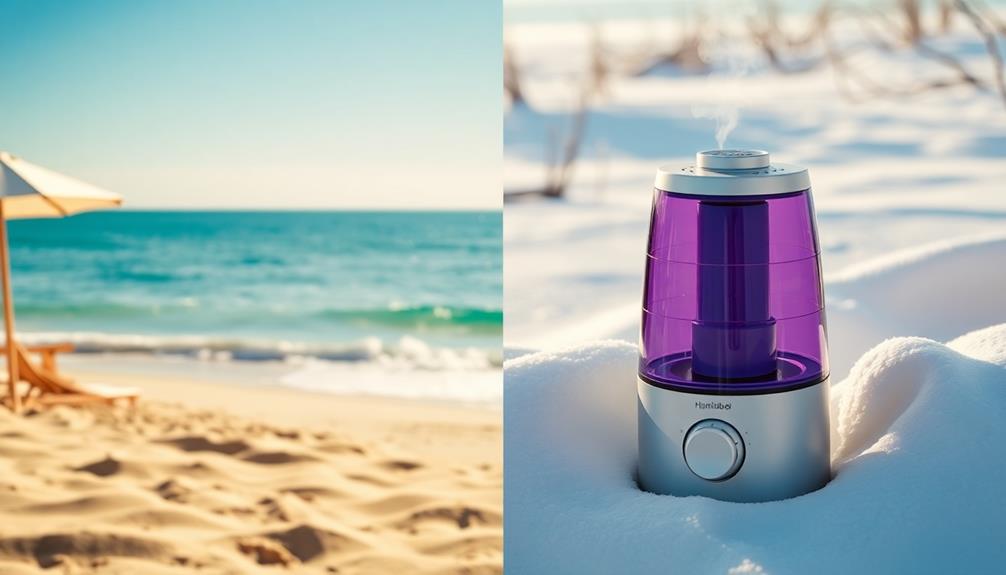
To keep your piercings healthy, focus on both your overall health and essential hygiene practices.
Staying hydrated and eating well helps your body heal, while regular cleaning with saline solution prevents infections.
Maintaining Overall Health
When it comes to maintaining the health of your piercings, several key factors play a significant role. First and foremost, staying properly hydrated is vital. Your skin needs moisture to heal effectively, especially during winter when indoor air tends to be dry.
Don't forget about nutrition either; a balanced diet rich in vitamins and minerals supports your immune function, which can help ward off infections in newly pierced areas.
Additionally, regular exercise is essential. It boosts circulation, promoting faster healing and reducing the risk of complications.
Managing stress is just as important, as high-stress levels can negatively impact your skin's condition and slow down the healing process.
Here are some tips to keep in mind for maintaining overall health:
- Drink plenty of water daily to support hydration.
- Include nutrient-dense foods in your diet to enhance immune function.
- Engage in physical activities to improve circulation and reduce stress.
Essential Hygiene Practices
Maintaining proper hygiene for your piercings is fundamental to guarantee they heal well and stay infection-free. Regularly clean your piercings with a saline solution or a cleanser recommended by your piercer. This practice is significant, especially during seasonal changes when bacteria can thrive.
It's also important to make certain that your pets, if you have any, are kept away from your piercings during healing as they could introduce bacteria (like potential grape poisoning symptoms). Avoid touching your piercings with dirty hands; this simple hygiene practice minimizes exposure to harmful bacteria, which can lead to infections.
Diligently follow the aftercare instructions provided by your piercer to promote ideal healing. It's important to monitor your piercings for any signs of infection or irritation, such as redness, swelling, or unusual discharge. If you notice any of these symptoms, seek professional advice immediately.
Additionally, staying hydrated and maintaining a balanced diet is essential for skin health and immune function, both of which support the healing process of your piercings.
Protective Measures for Piercings

During the changing seasons, taking protective measures for your piercings is essential to guarantee they heal properly and remain irritation-free. Whether you're facing low temperatures in winter or the heat of summer, your strategy should adapt accordingly.
To protect your piercings, consider the following tips:
- Choose Soft Fabrics: Use cotton or silk clothing to minimize friction and irritation from your initial jewelry.
- Wear Appropriate Accessories: In winter, opt for hats to shield your piercings from extreme weather. In summer, breathable clothing can help avoid overheating.
- Use Moisturizers: Apply healing balms or moisturizers designed for piercings, especially during dry seasons, to maintain moisture and promote healing for your healed piercings.
Avoid tight-fitting accessories as they can irritate your piercings and limit airflow.
Always rinse your piercings with clean water after exposure to chlorinated pools or saltwater to maintain hygiene.
Aftercare and Maintenance Tips
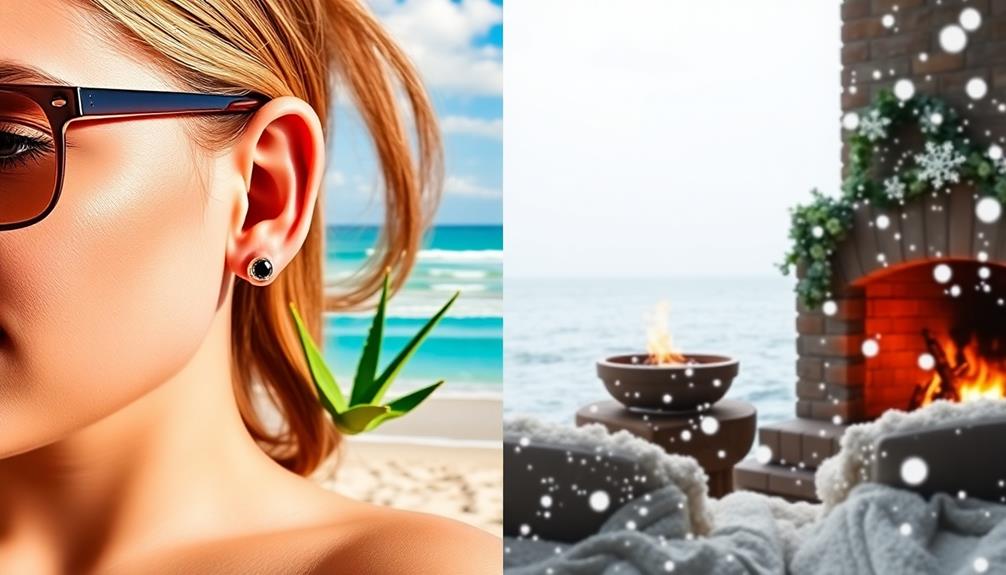
Taking care of your piercings requires attention to seasonal changes and hygiene practices.
You'll want to adjust your aftercare routine to guarantee proper healing, especially in different weather conditions.
Don't forget the importance of keeping your piercings moisturized to promote a healthy environment for healing.
Seasonal Healing Adjustments
When it comes to healing your piercings, adjusting your aftercare routine to the changing seasons can make a significant difference.
If you're getting a new piercing during the cold months, consider using a humidifier at home. This combats dry indoor air that can hinder healing, especially for facial piercings.
It's also important to be mindful of the materials used for your jewelry, as certain metals like titanium can be more comfortable for sensitive skin during seasonal shifts.
In summer, staying hydrated is key to reducing swelling in fresh piercings, as heat can exacerbate inflammation.
Regular cleaning with saline solution is essential year-round, but during the hotter months, pay extra attention to prevent infections from sweat and humidity.
Here are some tips for seasonal healing adjustments:
- Use scarves or hats to protect piercings from extreme winter weather.
- Avoid prolonged sun exposure in summer to minimize irritation.
- Monitor for signs of irritation or infection, especially during seasonal changes when your skin's sensitivity fluctuates.
Hygiene Practices Importance
Consistently maintaining proper hygiene practices is essential for the health and longevity of your piercings. Regular cleaning with saline solution or recommended cleansers helps prevent infections and promotes healing. Make sure to clean your piercings daily, especially during the initial healing phase.
Avoid touching your piercings with dirty hands to minimize bacteria exposure. This simple step is critical in reducing the risk of complications during the healing process. Follow all aftercare instructions given by your piercer, including steering clear of swimming in pools or hot tubs, which can introduce bacteria and irritate your piercings.
Monitoring your piercings for signs of infection or irritation is fundamental. Look out for redness, swelling, or unusual discharge, and don't hesitate to seek professional advice if you notice anything concerning. Additionally, changing your bedding regularly can help minimize irritation.
After showering or swimming, make sure to dab-dry your piercings gently. This practice supports overall piercing health and helps maintain a clean environment for healing.
Moisturizing Techniques Explained
Moisturizing your piercings is essential for maintaining skin health, especially during dry seasons. Keeping the area hydrated can greatly impact both the healing process and comfort of your piercings. Incorporating essential oils for aromatherapy can further enhance your moisturizing routine, as certain oils like lavender and tea tree are known for their soothing properties.
Here are some effective moisturizing techniques to take into account:
- Use a gentle, fragrance-free moisturizer: Apply this around fresh and healed piercings to combat dryness and irritation, particularly in winter.
- Incorporate hydration from within: Drink extra water daily to support overall skin health and enhance the healing process of your piercings.
- Utilize saline solutions or healing balms: These can provide moisture, maintaining skin elasticity and preventing cracking around your piercings.
For nose piercings, think about using moisturizing tissues to reduce irritation from dry air.
Remember to patch test any new skincare products before applying them near your piercings. This helps avoid sensitivity reactions that could complicate healing.
Staying Informed and Engaged
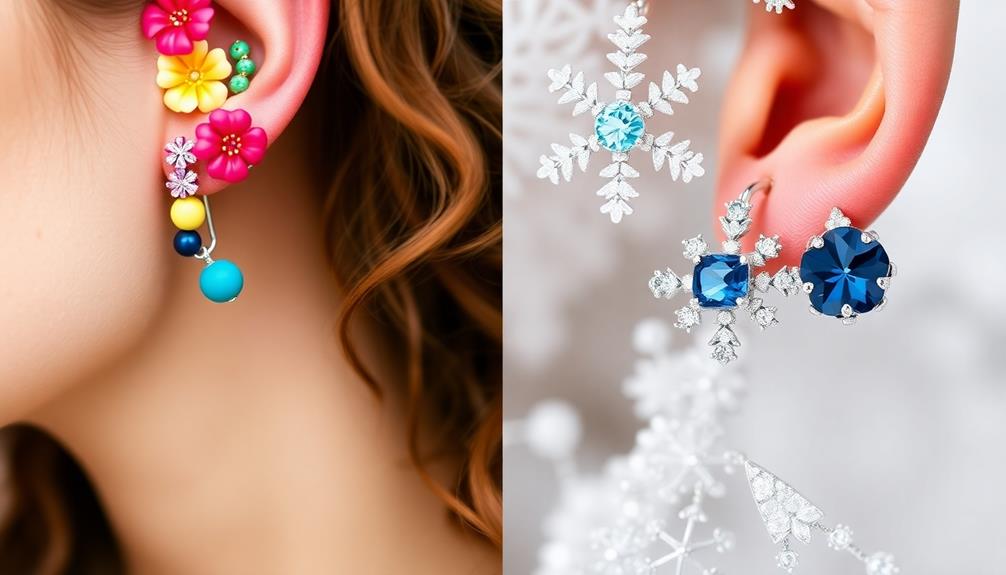
Staying informed and engaged is essential for maintaining the health of your piercings throughout the seasons. Following social media accounts dedicated to piercing care can keep you updated on seasonal trends that affect piercing maintenance.
You'll find timely tips tailored to changes in weather and environment that can impact healing. Engaging with professional piercers on online platforms allows you to receive personalized advice and answers to your specific concerns about how seasonal factors influence your piercings.
Whether you're curious about how winter dryness affects your healing or how summer humidity may complicate aftercare, these experts can help.
Reviewing educational resources on piercing maintenance will deepen your understanding of how environmental changes can impact your piercings.
Plus, attending workshops focused on piercing aftercare offers hands-on training and insights into seasonal challenges and solutions.
Seasonal Piercing Recommendations
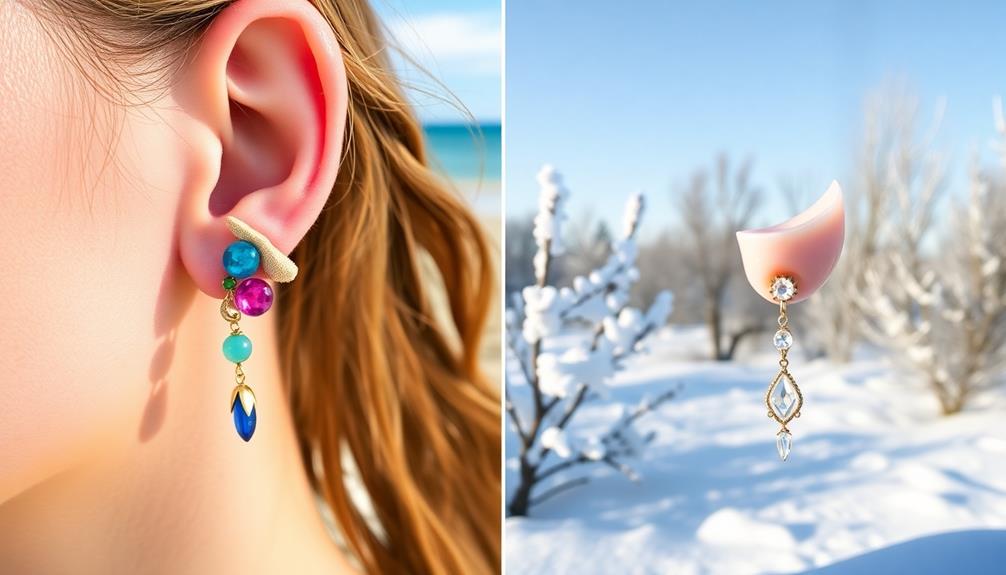
When considering new piercings, timing can make all the difference. The right season can enhance your experience and healing process.
For instance, winter is a great time for getting a piercing like an industrial or nostril. The layered winter clothes minimize irritation and reduce swelling due to lower blood flow.
Spring is also a fantastic choice for new piercings, allowing for adequate healing before summer. Warmer weather boosts blood flow, promoting faster healing.
Here are some seasonal recommendations for your piercings:
- Winter: Opt for industrials and nostrils for minimal irritation.
- Spring: Consider belly button piercings to match summer fashion, allowing for vibrant accessories.
- Summer: Navel and nipple piercings shine during this season, perfect for showcasing in swimwear and crop tops.
Frequently Asked Questions
Do Piercings Heal Better in Summer or Winter?
Your piercings tend to heal better in summer. Warmer temperatures boost blood flow, enhancing healing. In winter, cold and dry air can slow the process and irritate your skin, so be mindful of the season's impact.
What Is the Best Season for Piercings?
When considering the best season for piercings, spring's soothing sunshine supports swift healing. You'll enjoy a comfortable climate, allowing careful care and monitoring, ensuring your new adornments shine brightly by summer's start!
Does Weather Affect Piercing Healing?
Yes, weather affects piercing healing. Cold can hinder healing due to reduced blood flow, while humidity may cause swelling. Staying mindful of these factors helps you maintain healthy piercings throughout different seasons.
Should I Do a Piercing in Summer?
Imagine showing off your new piercing at the beach, but the heat causes swelling. If you're considering summer, just remember to stay cool and hydrated, and be cautious about sun exposure during your healing process.
Conclusion
In summary, seasonal changes can greatly impact your piercings, so it's essential to adapt your care routine accordingly. For instance, if you've got a new ear piercing, a friend of mine found that using a saline solution in the summer helped prevent irritation from sweat and humidity. By staying informed and following protective measures year-round, you can keep your piercings healthy and looking great, no matter the season. Don't underestimate the power of seasonal care!


